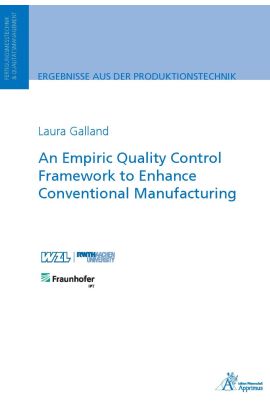The manufacturing sector is under high pressure for at least 15-20 years facing challenges like increasing globalization, digitalization, emerging technologies and markets but also volatile changes regarding customer and market demands. The list of challenges is as long as the possibilities that arise. Reacting to challenges and avoiding massive invests in new equipment and technologies are increasingly essential for a company’s success which is determined by its effectiveness of being efficient and productive. Hence, the productivity is the main driver to profitability. Evolving technologies and machines already enable an increase of manufacturing accuracy and productivity. But unless conventional manufacturing processes are not fully automated and the control activities partly done by humans, the final outcome of a process is determined by the involved stakeholders, product characteristics and resources.
The objective is to develop an empiric framework – a structure underlying a concept and methods to provide replicable guidance – as a threefold approach. Techniques from quality, knowledge and data management are combined whilst experience, resources and the demanded work piece geometry are considered as essential determinants aiming to provide a generic framework for process and product quality control. The framework is based on elements of quality control loops and expert systems encompassing on-machine and in-process metrology being able to gather process and work piece data prior, during and directly after the machining procedure. All data is set into relation within an extended data structure whilst sustainable and accessible process knowledge is built. This enables flexible and multiple utilization potentials like revealing hidden process specifics, capturing experience and utilization of data analytics for advanced process understanding but also preventive and predictive product and process control.
The validation is realized on a 5-axes milling machine and specifically defined demonstrator with a complex geometry. The setup is subsequently transferred to a practical use case of a SME, a make-to-order manufacturer of high precision motor racing components. The results show, that in each case valuable insights have been uncovered that potentially lead to improvements of the respective processes. Finally, it could be assessed that the framework is verifiable functioning and customizable to the specific use case and application environment.
| Autor | Galland, Laura |
|---|---|
| Gewicht | 0.309 kg |
| Erscheinungsdatum | 01.03.2022 |
Fertigungsmesstechnik und Qualitätsmanagement
An Empiric Quality Control Framework to Enhance Conventional Manufacturing
Kurzbeschreibung
Enhancing processes is one opportunity for conventional manufacturers to take it up with contemporary challenges. Quality control loops can be a powerful element to form a holistic framework for implementing suitable measures within the manufacturing environment, uncover potential failures early, contribute to failure prevention in the long-run and increasing production efficiency. The thesis aims for a solution of how to set up such a framework encompassing on-machine and in-process integrated.

